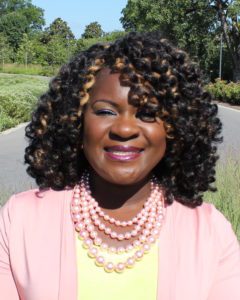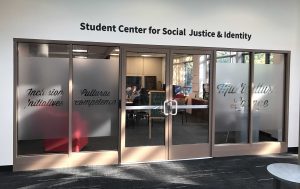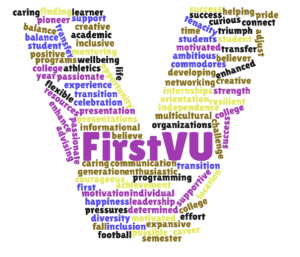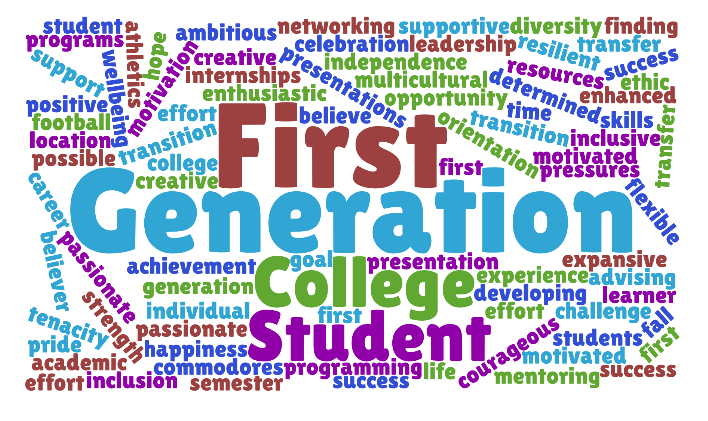“First generation students are not students that anybody needs to feel sorry for.”
This is Dr. Christiana Russell’s mantra. Russell serves as Director at Vanderbilt’s Office of Transition Programs, which the Dean of Students established in 2015. This year, Russell and her team are working closely with a student-led organization, FirstVU, to build visibility and support for first generation college students on Vanderbilt’s campus. Their primary goals include empowerment, the sharing of stories and mentorship as they work to create comprehensive programming and networking for first generation students.

First generation college students, or “first gens” are students who are the first in their nuclear families to attend college and earn a bachelor’s degree. First generation college students might face obstacles in their college years as they adapt to a highly competitive academic and social environment. According to an article from the Washington Post, these difficulties might include a lack of the resources that students with parents who attended a four year college or university might have, like professional networks or familiarity with college finances, as well as added pressure to succeed from their families. FirstVU and the Office of Transition Programs are working to provide support and resources to first generation students as they and their families navigate life at Vanderbilt.
Russell and two of FirstVU’s student leaders, Anarius Cathey and Christine Lim, spoke about the Office of Transition Programs, programming initiatives, FirstVU, mentorship and supporting a variety of strong first generation identities on campus. All three center their goals around one idea: they do not want anyone feeling sorry for first generation college students. Rather, they want first gen students to feel empowered and supported in the Vanderbilt community.
“We’ve had farther to run and we did it,” said Cathey. “Don’t feel sorry for your friend who’s a first gen. Yes relate to them in his or her struggles… but we don’t want to be known for being low income students.”
The Office of Transition Programs
One of Russell’s primary goals is to dispel the stereotypes surrounding first gen students, and she believes that the FirstVU executive leadership council fully exemplifies what it really means to be a first gen student at Vanderbilt.
“Yes they are first gen but that is not the totality of who they are,” Russell said. “These are really strong, capable young men and young women… they have what it took to get here, to get into Vanderbilt, and they’re making it like all of the rest of the students. Our office helps them connect to other students who share similar stories, similar backgrounds and to connect them to resources.”
 Since its founding in 2015, Vanderbilt’s Office of Transition Programs has been working to support first generation students in their transition through life at Vanderbilt. The office also works with transfer students and select scholarship students. This year, the office is housed in the Student Center for Social Justice and Identity in Sarratt 310. Russell believes that the move has greatly increased the office’s visibility. Both the Office of Transition Programs and FirstVU are trying to increase visibility on campus as they work to build their reach for first gen students.
Since its founding in 2015, Vanderbilt’s Office of Transition Programs has been working to support first generation students in their transition through life at Vanderbilt. The office also works with transfer students and select scholarship students. This year, the office is housed in the Student Center for Social Justice and Identity in Sarratt 310. Russell believes that the move has greatly increased the office’s visibility. Both the Office of Transition Programs and FirstVU are trying to increase visibility on campus as they work to build their reach for first gen students.
There is no singular first gen identity, and first gen students come from a wide variety of backgrounds. As these programs work to build a support network for first gen students on campus, their number one goal is making first gen students aware of the resources that exist for them. Russell has found that the diverse backgrounds of first gen students help expand the reach of services that the office can provide.
“I think there are different ways that a student can identify as a first gen,” Russell said. “Take me for example. My parents are from Nigeria but they went to school in the U.S, but being from a different culture, even having grown up in the U.S. – my college experience was so different and there were many times when I really couldn’t get my parents to understand. So I don’t want to exclude anyone if they feel like you know, my parents had a degree and I still feel some disconnect. It’s for everyone. I think that’s the beauty of our office as well. Transition Programs is an office that’s for any student in all types of transition.”
Russell and her team are focusing on intersectionality and identity as they work to create effective first gen programming. They understand that not every first gen’s story is the same and they are working to give all students access to the support systems they provide for first generation students. They have held sessions covering stress management during finals season and financial management while at school and on break.
First generation programming
Currently, the Office of Transition Programs is working with FirstVU to build programming for first gen students at Vanderbilt. This past fall they worked together to host three events geared toward first gen students: a first gen panel at Parents and Family Weekend, a discussion on success with Olympic gold medalist Davis Tarwater and a stress management event hosted with the Student Center for Wellbeing.
The Parents and Family Weekend panel featured FirstVU student leaders as well as Vanderbilt faculty members who were also first generation college students. These faculty members included Dean of Students Mark Bandas, Associate Dean Frank Dobson and Senior Assistant Provost for Faculty and Strategic Affairs Dawn Turton.
“It was just beautiful because being a first gen student is not the end of their story, it was part of their story, and here they are – successful, top leaders,” Russell said. “I think that’s an important part of what we do, is sharing stories. And everyone’s story is different. There is no one first gen story. These are diverse stories from diverse individuals from diverse backgrounds which lead to our whole idea of diversity and inclusivity.”
Everyone’s story is different. There is no one first gen story.
Russell sees the parents and families of first generation college students as a sort of strategic partner in the transition process. She wants families to feel included and capable as they venture on this educational journey with their children. She began the strategic partnership with this panel, and she hopes to continue it through similar events in the future.
“We realize that for first gen students families are a key component, and we want to make sure we reach out to families as well – helping them to help their student and empowering them to not feel like ‘oh because I didn’t go to college I don’t have the tools or I can’t help or support or encourage my student’,” Russell said.
Russell sees strategic partnerships as a crucial aspect behind the success of first gen programming. She is working with numerous campus resources to plan and structure programming that will benefit first generation students as well as other students on campus. This spring she is looking forward to launching a series of interview events through a partnership with Vanderbilt’s Career Services.
“In the spring we have two employer panels,” Russell said. “We are partnering with Career Services, and we are excited about that because this gives an opportunity specifically for first gen students who might not have the networking opportunities in terms of internships for the summer and co-ops and all of that. So we are bringing employers to campus to be able to sit at a table and to be able to have this mock interview experience.”
FirstVU
 In addition to programming through the Office of Transition Programs, Vanderbilt’s FirstVU student team is working to share stories of struggles and successes and create a sustainable mentorship program for first generation students at Vanderbilt. FirstVU’s Public Relations Chair, senior Christine Lim, found that first generation students at Vanderbilt sometimes lack necessary support networks in their first few semesters at Vanderbilt. Lim is the recipient of a Posse Scholarship, a program that provides full-tuition to about 10 New York City students each year at Vanderbilt.
In addition to programming through the Office of Transition Programs, Vanderbilt’s FirstVU student team is working to share stories of struggles and successes and create a sustainable mentorship program for first generation students at Vanderbilt. FirstVU’s Public Relations Chair, senior Christine Lim, found that first generation students at Vanderbilt sometimes lack necessary support networks in their first few semesters at Vanderbilt. Lim is the recipient of a Posse Scholarship, a program that provides full-tuition to about 10 New York City students each year at Vanderbilt.
“When I got on campus, I felt like my Posse really helped me and got me through the process, which is what I’m hoping to bring to FirstVU, that family support system throughout those four years at college,” Lim said. “Part of our mission is to create critical conversations on campus but I think also the main goal is to be each other’s support system… So that’s one of the organizations that I’m looking to potentially partner with FirstVU, and so is QuestBridge. I’m not going to say they’re targeted at first generation students, but I think it’s a great outlet for QuestBridge students or Posse students to know and we definitely welcome any other organizations that need a part.”
First generation students can often feel this pressure to succeed… even more so because your parents are expecting it from you, you’re the first to do it, so you want to carry this torch.
FirstVU is hoping to use the intersectional aspect of the first gen population at Vanderbilt: that many first gen students participate in a variety of organizations and programs, and some may have shared experiences, to help build a wider network of support.
Cathey said support networks are a necessity throughout the Vanderbilt experience.
“Exposure is tough. People underestimate [that] if your parents went to college, they understand [the difficulties in transitioning to college],” Cathey said. “So yes a C in college – girl yes! But often parents who didn’t go to college have these high expectations because their child has performed in high school very well… first generation students can often feel this pressure to succeed… even more so because your parents are expecting it from you, you’re the first to do it, so you want to carry this torch.”
FirstVU is hoping to mitigate some of this pressure through a mentorship program. Their hope is that FirstVU can help build a strong first gen community that can provide support and resources to each other and guide younger first gen students in their time at Vanderbilt. Cathey and Russell are also looking to expand the definition of first gen. Some people may encounter similar obstacles in their time at Vanderbilt, even if their parents went to college.
You’re the first. Since when was being the first at anything something bad?
Russell, Lim and Cathey all emphasized that they want transition programs and FirstVU to be open and available to all students, no matter what. Ultimately, they are looking to provide support and community, and they want as many people as possible to benefit from the resources that emerge as a result of their work.
“FirstVU is open is open to every organization… you don’t have to be first gen to join. If you’re really passionate about it and you want to be a mentor then you’re definitely welcome to join. Also we don’t want it to be a negative stigma,” Lim said.
Ultimately the first goal for both the Office of Transition Programs and FirstVU is to increase exposure and awareness around resources and community available to them, and they want students to take advantage of these opportunities. Their hope is that, with increased exposure, they will be able to create a comprehensive mentorship program that will become a backbone for the first gen community at Vanderbilt. Russell, Lim and Cathey all emphasize that throughout this program expansion they are keeping a common theme in mind: first generation students are not people anyone needs to feel sorry for.
“We want everyone to know that being a first gen isn’t something that you should be ashamed of… like you’re a first gen,” Cathey said. “You’re the first. Since when was being the first at anything something bad?”

